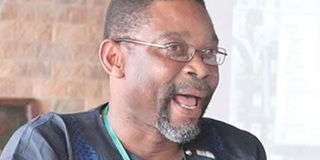Nigerian literature don Prof Harry Garuba takes the final bow in SA

Prof Harry Garuba. PHOTO | AGENCIES
One of the several books of literary criticism I have spearheaded in the past decade is Reading Contemporary African Literatures: Critical Perspectives (2013). The tome is a collection of 20 chapters penned by literary scholars from Africa and its diasporas.
The book is co-edited with the late Malawian scholar Reuben Makayiko Chirambo, who until his death on October 6, 2011, was a senior lecturer in the Department of English at the University of Cape Town.
The idea of this book came out of conversations with Prof Harry Garuba, the former director of the Centre for African Studies at the University of Cape Town.
GRIEF
It was with much grief that I received news of the death of Prof Garuba, after a short illness, on February 28.
For many years, this erudite 61-year-old Nigerian scholar was the only black lecturer at the University of Cape Town’s Department of English. Later, he was joined by Chirambo. They were the only two black Africans teaching in that department in 2009 when this book came into existence as an idea.
Chirambo and Garuba had welcomed me as a visiting researcher from the Free University of Berlin, Germany, where I was then based. I had received generous support from the Centre for International Cooperation of FU Berlin to visit South Africa for my studies at the archives of UCT’s Africa Gender Institute.
Soon, my week of returning to Berlin arrived. One evening while sharing a farewell cup of coffee, the bespectacled Harry strolled into Cafe Sofia in Rondebosch, the suburb next to UCT.
As the cape evening disappeared like the china pots of coffee at our cerulean corner, he left earlier than us to retire to his family.
Just before he left, he threw a memorable challenge to us — to come up with a book project that can articulate some of the major points that had been discussed that evening. The book will serve as memento of the vision of three African critics from Malawi, Kenya and Nigeria who met in South Africa.
SCHOLARSHIP
He advised us that the book should take the form of an anthology so that it gives an arena to a diverse constellation of scholarship by both established and emergent critics of new African literatures.
He exhorted us to articulate traditionally marginalised literary terrains of the island republics of the Gulf of Guinea, the Indian Ocean, including Mauritius, occluded literary traditions from South Africa such as Afrikaans-language texts as well as Eastern African ones such as Amharic-based canons.
Harry saw the possibility of broadening the palimpsests of African literature within the discourses he held close since his undergraduate days: comparative literature and cosmopolitanism. A student of Wole Soyinka, he wrote his graduate research on comparative dimensions of West African literature and the literatures of the Black diaspora.
His interest in this transatlantic locutions and interlocutions would later see him visit Brown University in the US and the University of West Indies.
His work at the Centre for African Studies and his pan-Africanist philosophy of education became worthwhile legacies of our meetings.
We would later work together with other colleagues to establish a staff linkages programme between the University of Cape Town, Free University of Berlin and Kenyatta University, my alma mater and current domicile. Several PhDs and conferences were produced by this tripartite DAAD-funded exchange.
LIONESS
Harry came to Nairobi in one of those exchanges. We sat again in a coffee house downtown and remembered Reuben. He talked of how lonely he felt at times in the circuits of South African academia.
At 61, much of his adult life as a literature teacher, professor and poet had occurred in Cape Town, where he had family.
He talked of the challenges, of struggles to keep the Centre for African Studies afloat, from financial struggles to contestations cross-questioning the relevance of humanities in the 21st century.
I listened and signed a petition he later sent to me via email to support his fight. The Centre for African Studies won. He retired as its director and continued teaching, mentoring and publishing widely from the Department of English at UCT.
Harry is now gone, perhaps to join Reuben, his workmate. He is now a wayfarer who has followed, early, the shining path freshly travelled by his recently deceased generational peers, Prof Tejumola Olaniyan and Prof Pius Adebola Adesanmi, who went down in Bishoftu with many of our citizens in the ill-fated Ethiopian Airlines Flight 302 exactly a year ago.
MENTORED
Nigerians at home and abroad have penned eulogies and elegies in the wake of this sudden departure of Prof Garuba.
Here in Kenya, among the current generation of lecturers, many are those he mentored, especially those who graduated from the universities of Pretoria, Witwatersrand, Cape Town and Stellenbosch University.
Today, the world is lonelier by the silence governing this loss. Yet speech energies of this soft-spoken giant of contemporary African literature will live on whether in his YouTube lectures, his poetry books, and his academic papers, or in his fecund pan-African spirit among us.
Dr J.K.S. Makokha teaches literature and theatre at Kenyatta University. His books are available on www.amazon.com.




